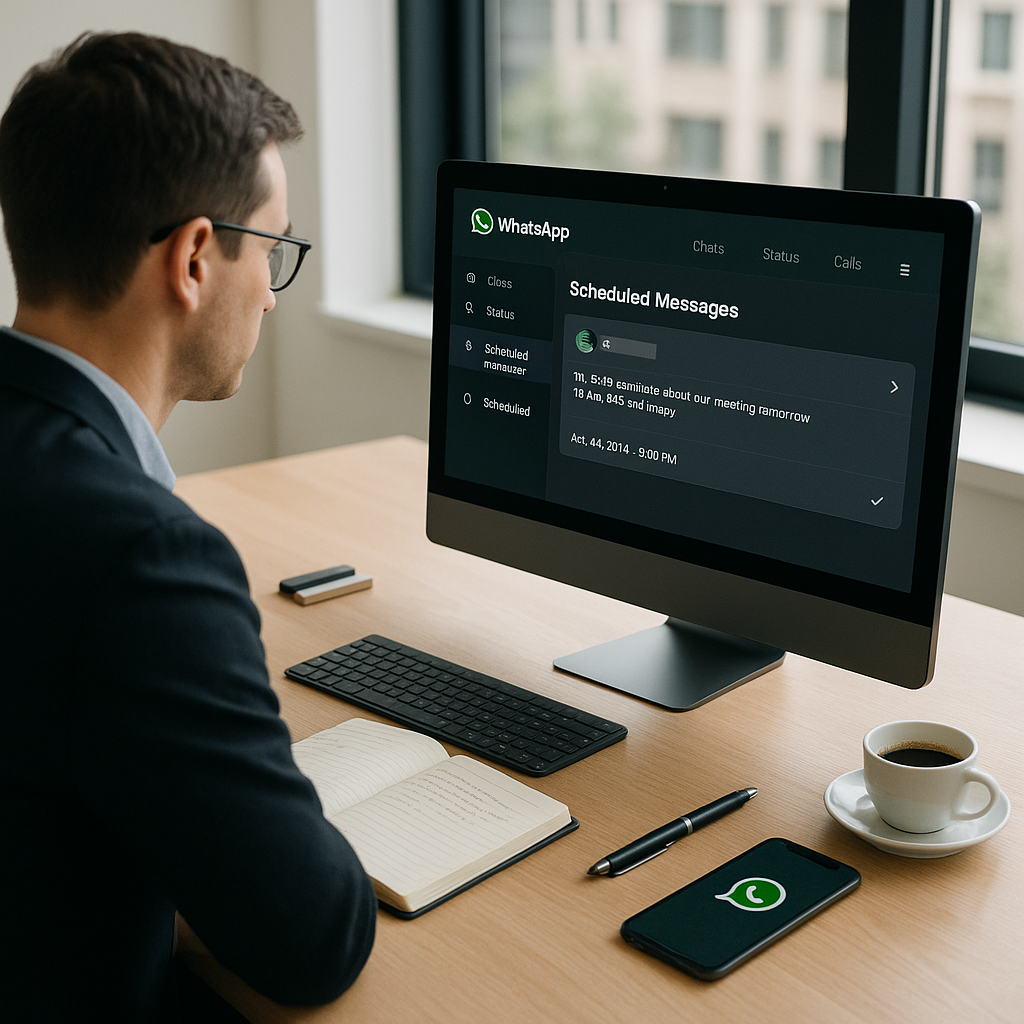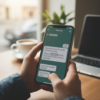Introduction to WhatsApp Automatically

A professional working in an office space scheduling messages on WhatsApp using a desktop computer.
WhatsApp Automatic represents a revolution in digital communication management, offering the ability to automate and schedule messages to improve efficiency. With increasing digitalization, businesses and professionals are looking for ways to optimize their workflow, and WhatsApp Automatic is becoming a valuable ally.
WhatsApp's automation concept allows you to send messages without having to be physically present, allowing you to maintain continuous communication with customers and collaborators. This not only improves productivity but also contributes to better time management.
By integrating automated responses, companies can provide customers with immediate feedback, improving the user experience and increasing satisfaction. Furthermore, these techniques can be applied to both small businesses and large organizations.
WhatsApp Automated isn't just useful for customer service, it can also be used for marketing, promotions, and regular updates. Imagine being able to inform your customers about new offers, events, or operational changes promptly and effortlessly.
To begin, it's essential to understand the basic mechanisms and capabilities of this technology. We'll explore its key features and how they can be used to enhance your communications strategy.
Ultimately, WhatsApp Automatic is an invaluable resource for anyone looking to streamline communications management, offering a versatile and powerful platform to address the challenges of the modern market.
Benefits of Scheduling Messages on WhatsApp
Scheduling messages on WhatsApp offers numerous advantages, especially for those running a business or needing to maintain ongoing customer relationships. One of the most obvious benefits is operational efficiency: it allows you to send messages at specific times, without having to manually intervene.
This feature is particularly useful for marketing campaigns. You can schedule promotions or product updates to be sent at strategic times, reaching your customers at the right time. A great strategy can increase sales and strengthen loyalty.
Another advantage is the ability to maintain ongoing contact with your audience. Scheduled messages can be used to remind appointments, send birthday greetings, or update customers on important news, demonstrating your attention and care.
Companies can also use scheduled messages to coordinate internal teams, sending reminders or updates on ongoing projects, without the risk of forgetting important communications.
Additionally, this feature allows for better time and resource management. With fewer manual interventions, staff can focus on tasks that require more attention, improving overall productivity.
Finally, scheduling messages is a great way to ensure your communications are always consistent and timely, helping to build a professional and trustworthy company image.
How to Activate Automatic Replies
Enabling automatic replies on WhatsApp is a simple process, but requires a few key steps to implement correctly. First, it's essential to have a WhatsApp Business account, which offers more advanced features than the standard app.
To get started, open the WhatsApp Business app and navigate to the settings. You'll find the "Business Settings" section, where you can enable automatic or away replies. This feature is crucial for those who can't respond to messages immediately.
Autoreplies can be customized to suit your business needs. For example, you can create welcome messages for new customers or out-of-office replies during business closures. Make sure the messages are clear and informative.
You can also set specific times for automatic replies to activate. This is especially useful for managing after-hours communication, ensuring customers always receive a response, even when you're unavailable.
Another advantage of autoresponders is the ability to direct customers to appropriate resources, such as links to FAQs, alternative contact details, or informational guides. This reduces workload and improves the user experience.
Finally, testing your autoresponders is essential to ensure they work properly. Simulate different scenarios to verify that messages are sent as expected, avoiding communication issues with customers.
Tools for Scheduled Messages on WhatsApp
To send scheduled messages on WhatsApp, there are several tools that can simplify the process and increase efficiency. One of the best known is WhatsApp Business API, which offers advanced features for automating business communications.
Another powerful tool is SendApp, a platform that allows you to send scheduled messages and automate responses easily and intuitively. SendApp is ideal for those looking for a complete solution for managing WhatsApp interactions.
There are also third-party apps, like Sked Social or Buffer, that offer scheduling features for WhatsApp. These apps are perfect for those who want to integrate social media platforms with WhatsApp, centralizing all their communications in one place.
For those looking for a more customizable solution, integrating with automation tools like Zapier may be the answer. Zapier allows you to connect WhatsApp to a wide range of applications, automating complex workflows.
Additionally, tools like Twilio can be used to further customize automations, allowing you to create personalized responses and scheduled message flows at scale.
Finally, it is essential to evaluate the specific needs of your business to choose the most suitable tool, ensuring that it is compatible with your communication strategies and your business objectives.
Step-by-Step Guide to Recurring Messages
Setting up recurring messages on WhatsApp may seem complex, but by following a step-by-step guide, you can simplify the process and ensure maximum efficiency. Here's how:
- Choose the Right Tool: Start by selecting the tool you want to use for your recurring messages. SendApp It is an excellent choice for its advanced features and ease of use.
- Define Your GoalsDetermine which messages you want to send and how often. This could include appointment reminders, weekly updates, or monthly promotional messages.
- Create Messages: Draft messages that reflect your company's tone and style. Personalize the content to make it relevant and engaging for your audience.
- Schedule the SendingUse your chosen tool to schedule message sending. Set specific dates and times to ensure messages reach recipients at the most appropriate times.
- Test the ProcessBefore launching your strategy, run some tests to ensure your messages are delivered correctly. Verify that your content displays as expected on different devices.
- Monitor and AdjustAfter activation, monitor responses and message effectiveness. Make adjustments if necessary to optimize engagement and achieve your goals.
By following these steps, you can effectively manage recurring messages, saving time and improving communication with your audience.
Best Practices for Optimizing Responses
Optimizing your WhatsApp auto-replies is essential to ensuring effective and professional communication. Here are some best practices to consider:
- Customization: Make sure your autoresponders are personalized with the recipient's name whenever possible. This adds a personal touch and increases engagement.
- Clarity and ConcisenessKeep your messages short and clear. Avoid corporate jargon and use simple language that everyone can understand.
- Useful InformationInclude links to helpful resources like FAQs, guides, or contact forms. This helps customers quickly find the information they need.
- Timely ResponseAutoreplies should be sent immediately after a message is received. Efficiency is the key to good customer service.
- Tests and UpdatesTest your autoresponders regularly to ensure they're always up-to-date and relevant. Adjust messages based on customer feedback.
- Consistent ToneMaintain a tone consistent with your brand's image and values. This strengthens your corporate identity and builds trust with your audience.
By implementing these best practices, you can significantly improve the effectiveness of your WhatsApp auto-replies, promoting smoother and more professional communication.
WhatsApp Automation: Mistakes to Avoid
WhatsApp automation offers many benefits, but there are also some common mistakes to avoid to ensure effective implementation:
- General MessagesAvoid sending overly generic or standardized messages. Personalize your content to keep it relevant and engaging for the recipient.
- Message OverloadDon't send too many messages too quickly. This can be intrusive and lead recipients to block or ignore your messages.
- Failure to Verify ResponsesDon't forget to monitor and respond to any necessary manual interactions. Automation doesn't completely replace human interaction.
- Incorrect Settings: Make sure your automation settings are correct, ensuring messages are sent to the right recipients at the right times.
- Don't Respond to FeedbackIgnoring customer feedback is a serious mistake. Use the comments you receive to continuously improve your communication strategies.
- Lack of TestingNot testing automations before launch can lead to embarrassing errors. Always perform thorough testing to ensure everything is working properly.
By avoiding these mistakes, you can implement WhatsApp automation more effectively, improving communication and interaction with your audience.
FAQ: Common Problems and Solutions
How can I fix the problem of unsent messages?
Make sure your internet connection is stable and your automation settings are configured correctly. Also, check your app permissions to ensure the necessary access.
Why aren't automatic replies triggering?
Make sure that automatic replies are enabled in your WhatsApp Business settings and that the activation times are set correctly.
Is it possible to customize automatic replies?
Yes, you can customize your automatic replies through your WhatsApp Business settings to make them more relevant and engaging for your audience.
What are the limitations of using third-party apps for WhatsApp?
Third-party apps may not offer all the features of the WhatsApp Business API and may have security and compatibility limitations.
How can I improve the response rate of scheduled messages?
Make sure your messages are relevant and sent at strategic times. Offer valuable content and incentives to encourage responses.
How to handle negative feedback received via WhatsApp?
Respond promptly and professionally to negative feedback, offering solutions or clarifications. Use the feedback to improve your products or services.
How SendApp can help businesses and professionals
SendApp It's an innovative solution designed to help businesses and professionals efficiently manage their WhatsApp communications. It offers advanced automation features, such as message scheduling and integration with other digital platforms.
Thanks to SendApp Agent, you can improve customer interaction management by centralizing all communications in a single, easy-to-use platform. This saves you time and resources, allowing you to focus on what really matters to your business.
If you want to further optimize your communication strategy on WhatsApp, you can request a WhatsApp consultationSendApp experts will guide you in choosing the solutions best suited to your needs, ensuring ongoing, personalized support.







